A Preview of My Semester in Hangzhou, China
Costa Rica, Spain, Italy, and now: China! My junior year with LIU Global is taking me almost 8,000 miles away from North Carolina to the lovely Chinese city of Hangzhou! Here’s a quick look at life in Hangzhou and what we have in store for us this semester:
Life in Hangzhou
Some Basic Info
Hangzhou is a city of nine million people located in the east of China, about an hour south of Shanghai by bullet train. It is the capital of the Zhejiang Province and home to the West Lake, an UNESCO World Heritage Site.
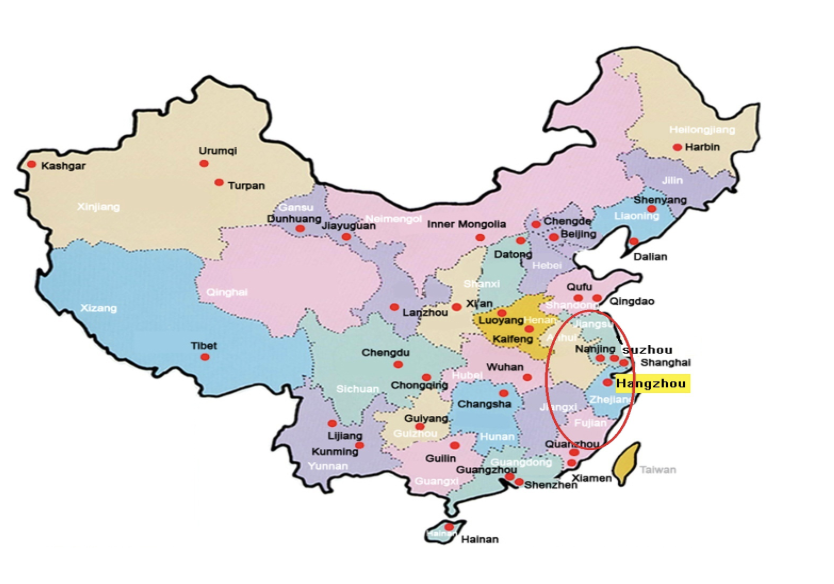
Dorm Life
In Hangzhou, the Global kids live in an international dorm with hundreds of other students from all over the world. We have single dorm rooms with a bed, desk, and wardrobe as well as an ensuite bathroom with a toilet, sink, and shower. It’s small, but it has everything I need, and I am glad to have my own space. Also, all six of us Global kids here this semester live right by each other on the same hall, which is pretty nice.
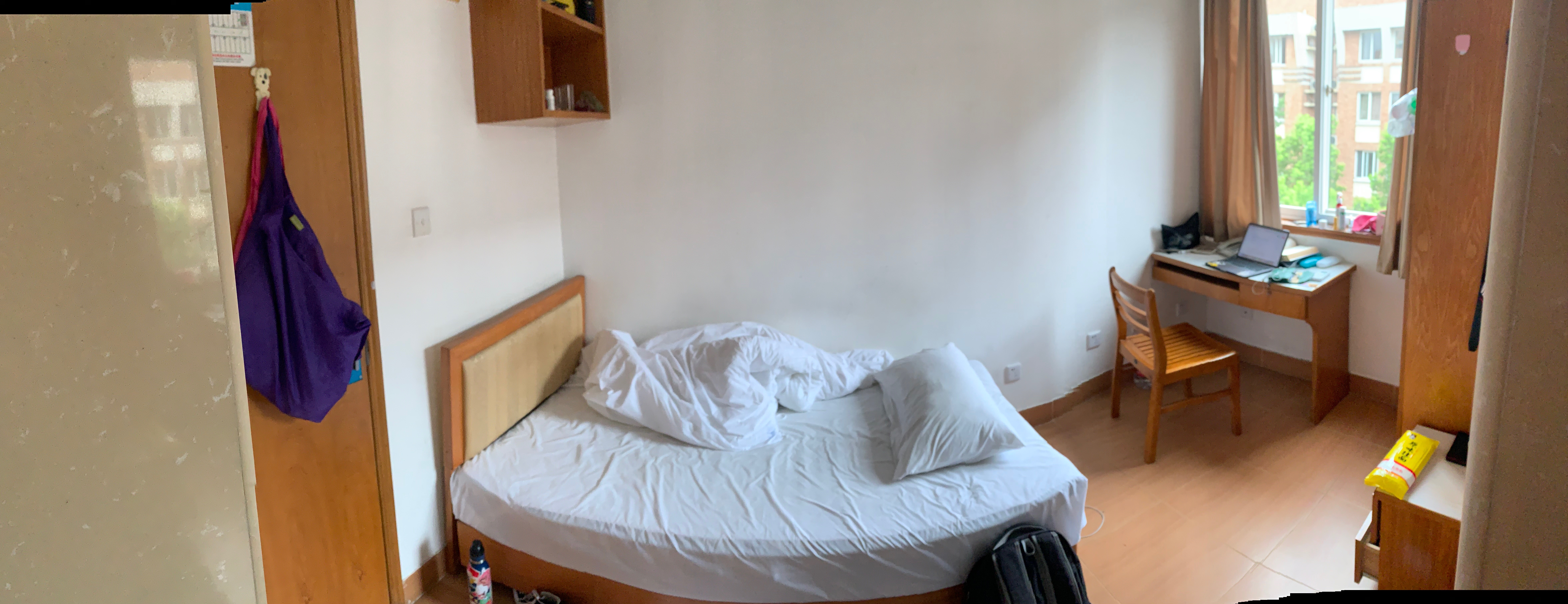
A not great panoramic photo of my dorm room, but you can at least get the gist
Weather and Air Quality.
When I first arrived in Hangzhou, the heat and humidity were unbelievable. It was pretty smoggy the first few days, and the smog caused it to feel like someone put a lid on a pot a left us to simmer. We were constantly soaked in sweat and cursing the humidity, which I swear rivals Florida’s. I was planning a shopping trip to buy more shorts and wishing for cooler weather when suddenly, it got cooler.
About a week in, the temperature dropped to about 70 degrees Fahrenheit. However, with the cooler temperatures came incessant rain, which hasn’t seemed to have let up and isn’t forecasted to let up in the near future. So, basically, the weather has been extreme and unpredictable, and I can only hope for some cool, dry days as the semester goes on.
As for the air quality, it hasn’t been too bad. Like I said, it was pretty smoggy the first few days, but since then it has been pretty clear. There is an Air Quality Index that is forecasted like the weather than I can check on daily or even hourly to determine the status of the air quality.

I’ve read and been told that the air quality tends to get worse in the winter when everyone turns their heating units on, but for now I’m enjoying mostly green to orange rated air quality days. When it eventually gets worse, I’ll be prepared with numerous inhalers and a mask.
Things to See
When people think of things to see in China, what probably comes to mind is the Great Wall, the Bund, and pandas, but Hangzhou also has some pretty cool things to check out. Like I said above, Hangzhou is home to the West Lake, which was classified as an UNESCO World Heritage Site in 2011. We went on an trip to the West Lake during our first week – there, we took a boat to an island, where we explored and saw a lot more beautiful nature than I expected to see while in China.
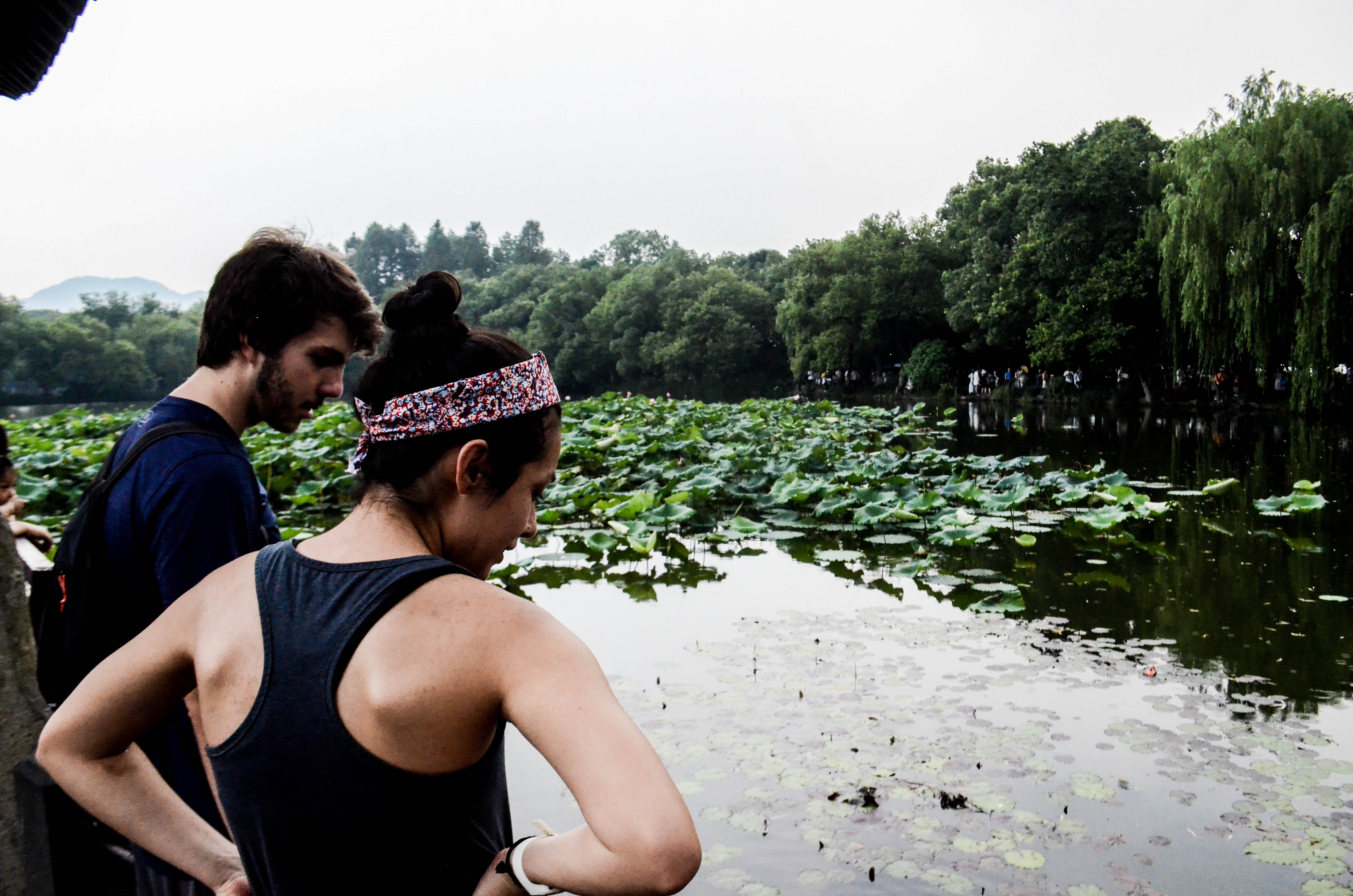
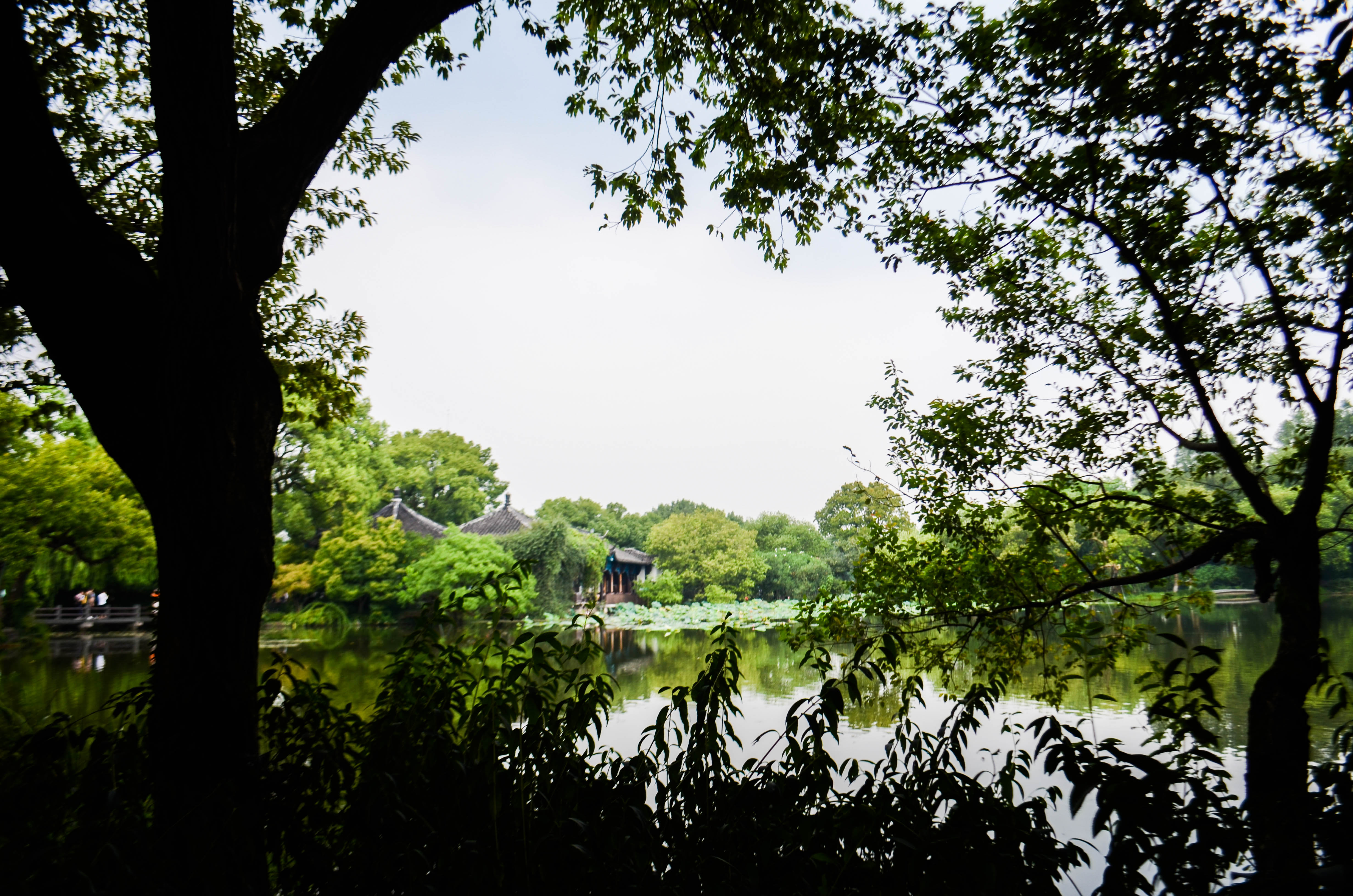
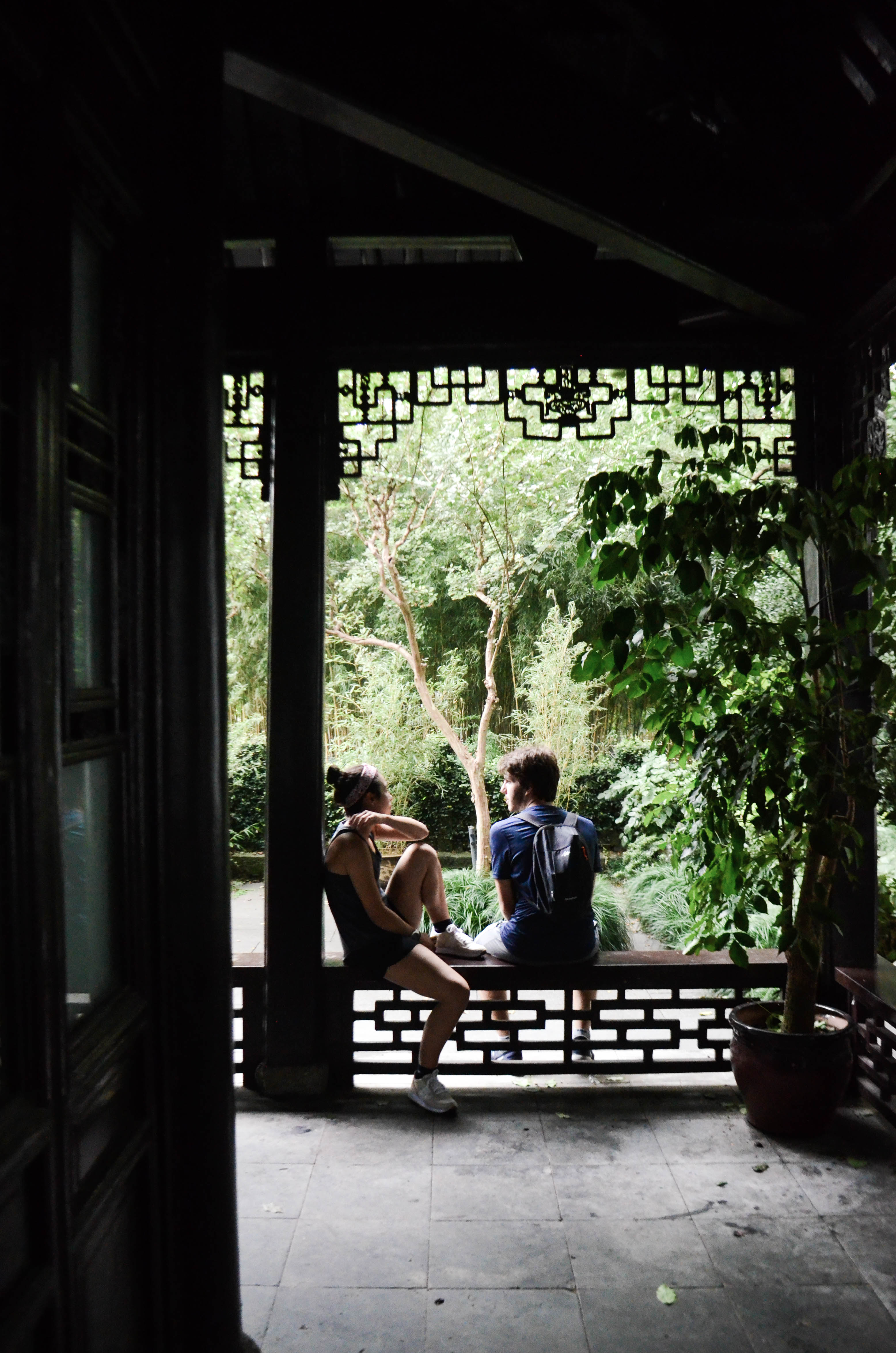
The West Lake and the vast green areas around it are beautiful, and I expect to spend a lot of time in that area throughout the semester. We have also visited the Lingyin Temple, one of the largest and wealthiest temples in China. The temple was stunning, and we spent an entire afternoon exploring its buildings and the surrounding cliffs dotted with statues and carvings. Hangzhou also boasts a grand canal, several pagodas, some museums, and a couple more temples that we hope to explore over the next few months.
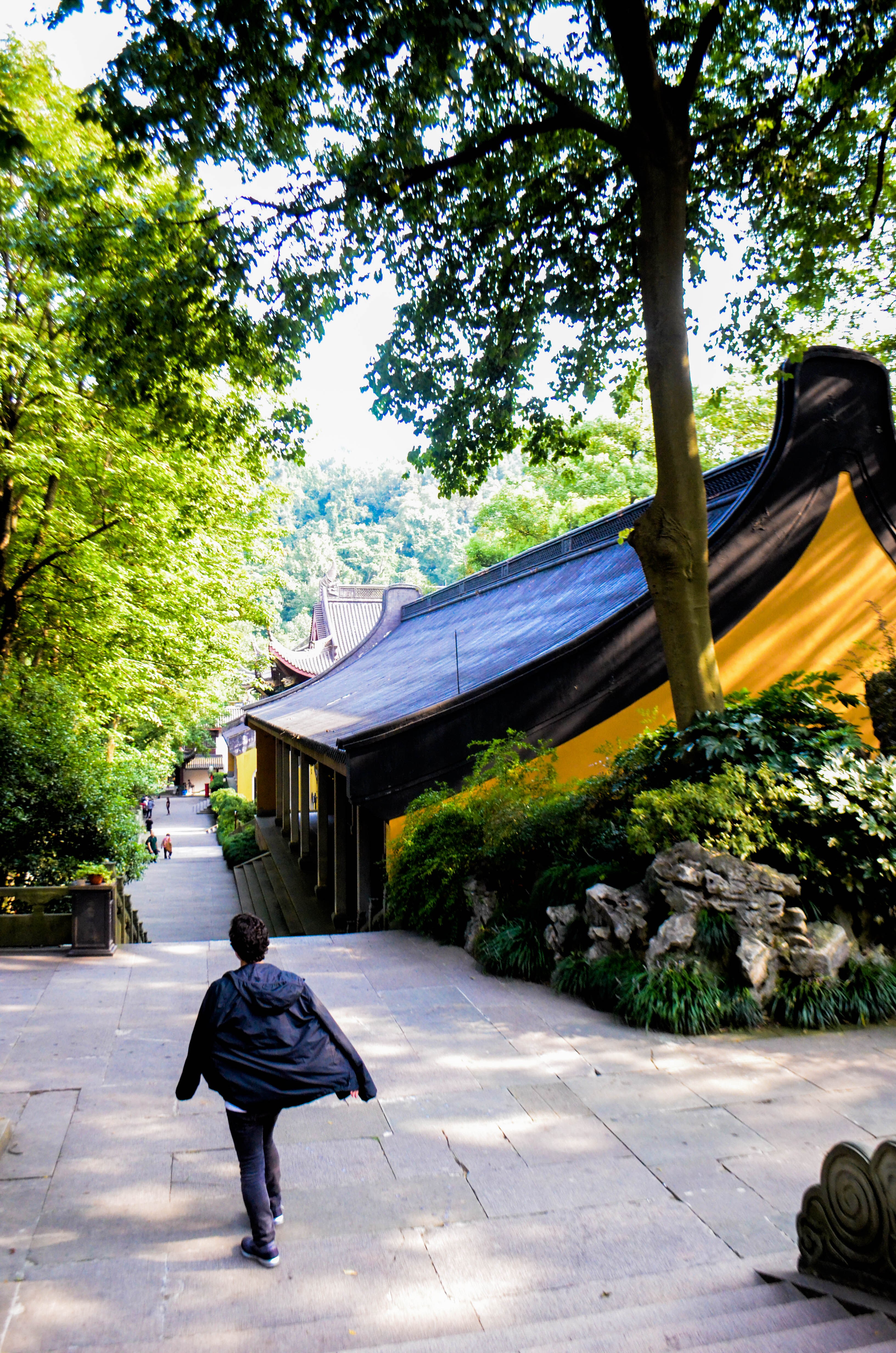
My classmate, Joey, walking around the grounds of the Lingyin Temple

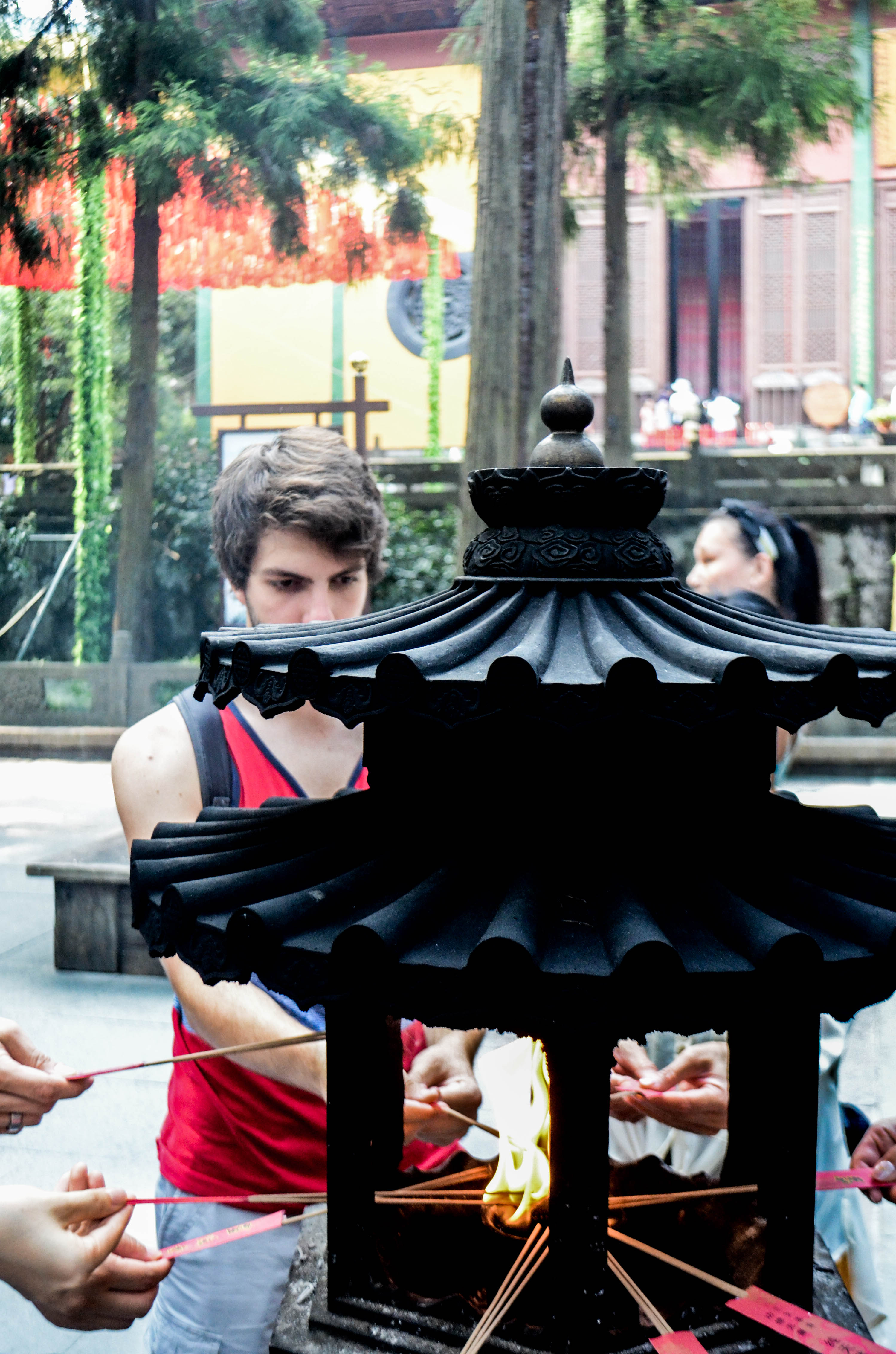
My classmate, Ross, lighting incense at the Lingyin Temple
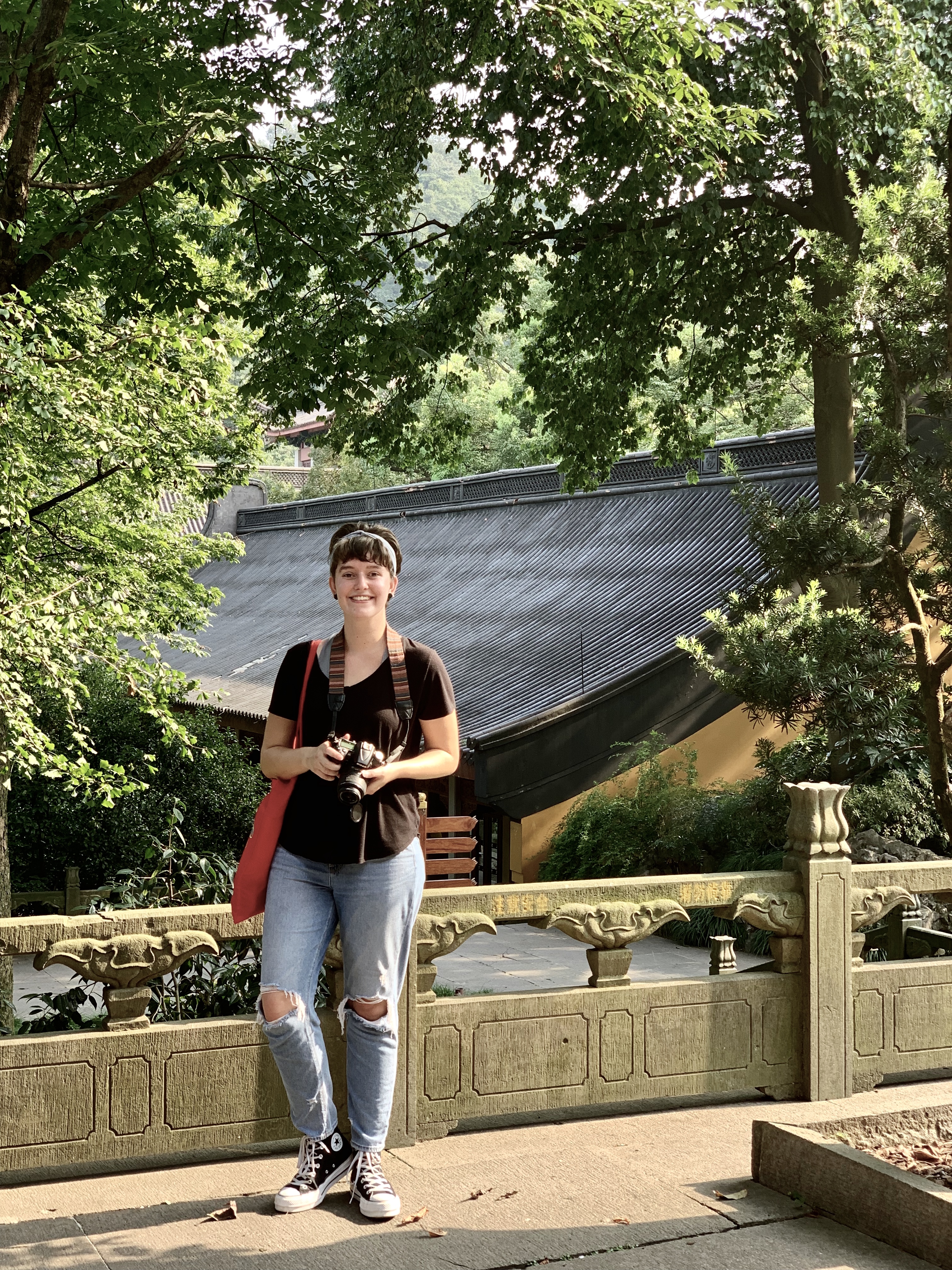
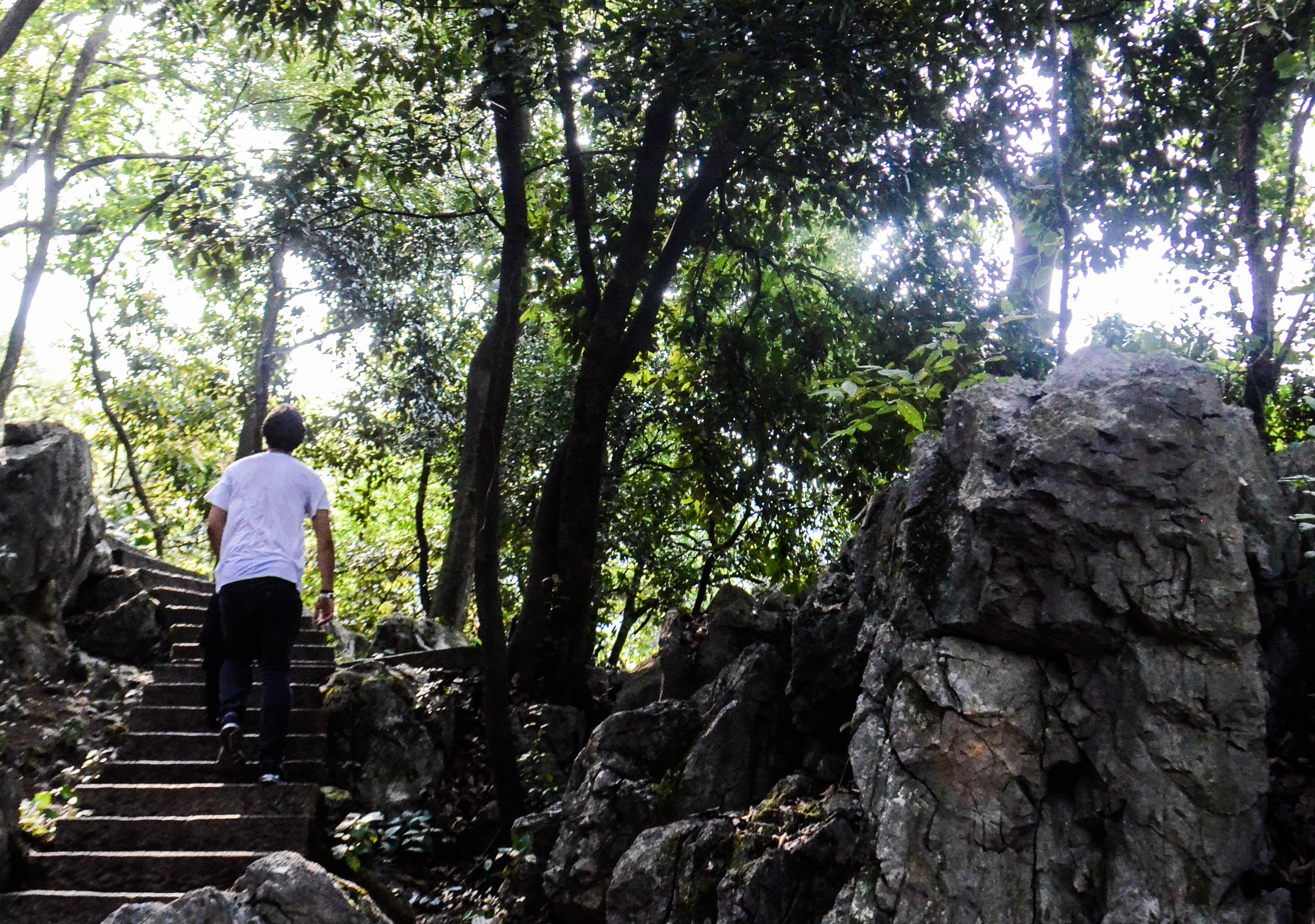
Joey walking around the cliffs in the area around the temple
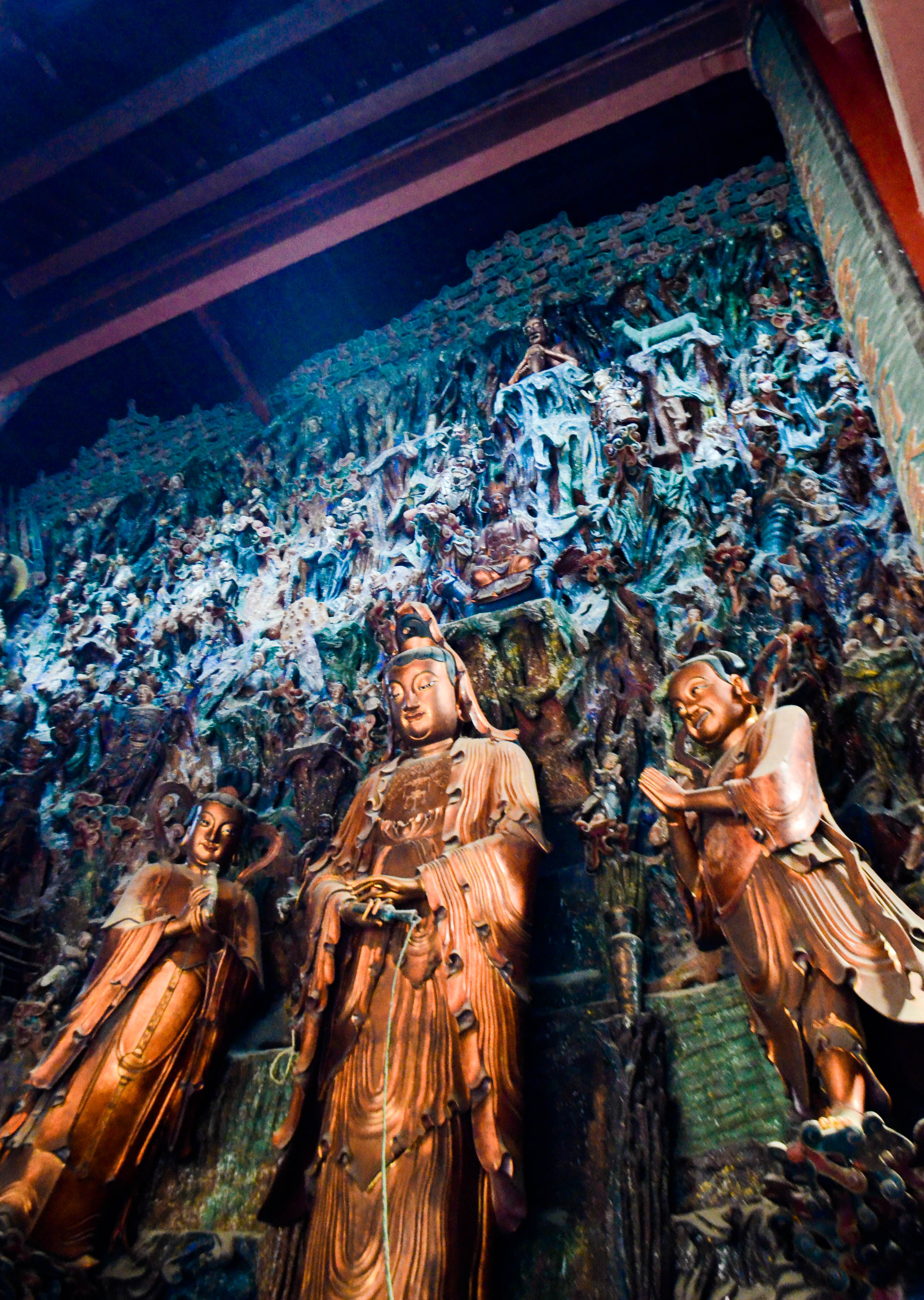
Art and statues at the Lingyin Temple
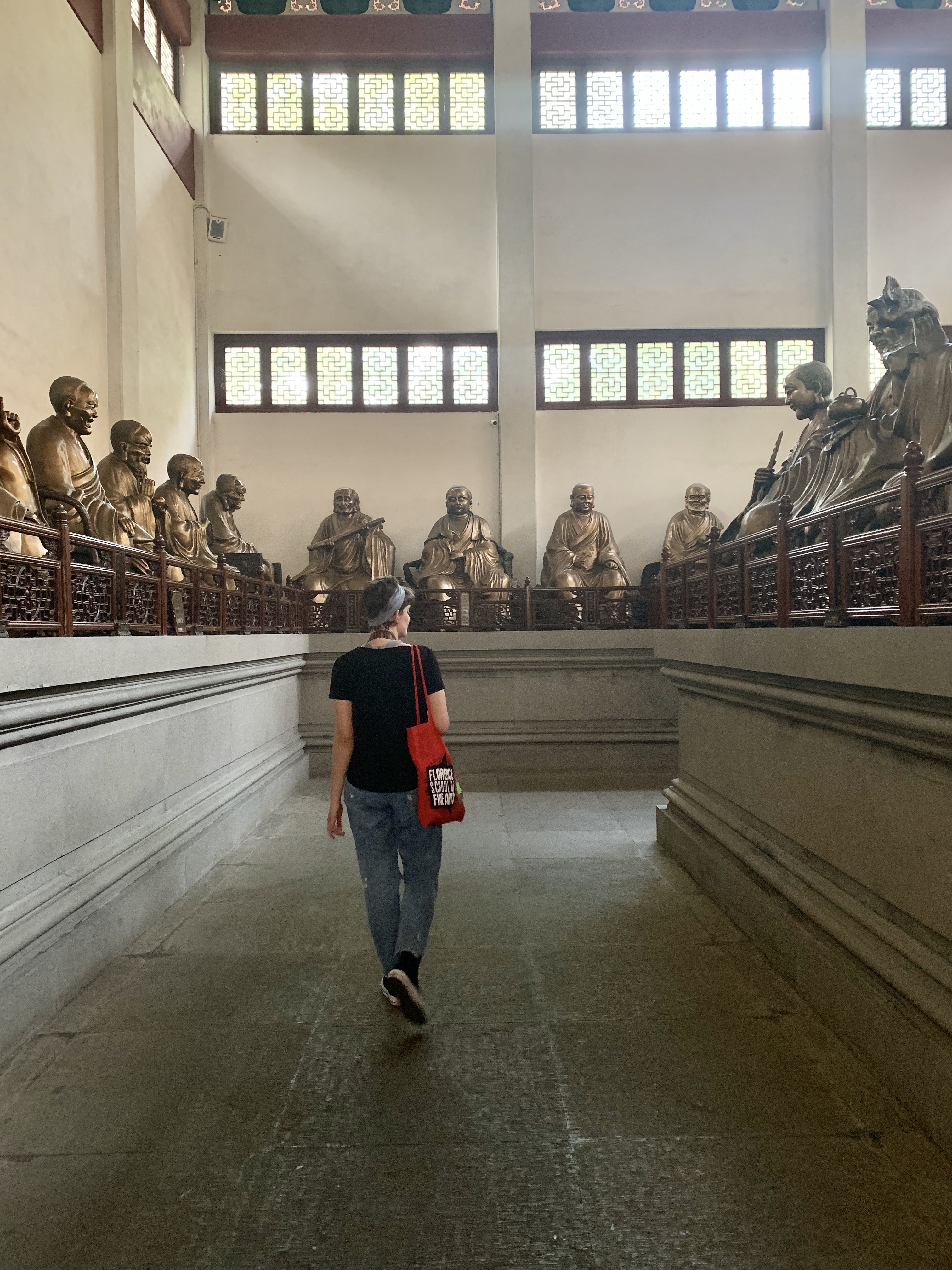
Admiring the statues of Arhats, or Buddhists that have reached enlightenment
Academics
The LIU Global center in Hangzhou partners with Zhejiang University, the 4th ranked university in China. Our center and dorms are all on the Yuquan campus of the university, and our Mandarin classes are facilitated by them. Here’s a bit about the Mandarin classes and the classes we have through Global:
Mandarin!!!
Ah, Mandarin. The thing that intimidates me most about living in China. It is an absolute bear of a language, but we’re gonna tackle it with a whopping 6 credit intensive Mandarin class that we will have for up to three hours a day four days a week.
We learned some survival Mandarin during our first full week, but I think we’re all excited to really get into it and hopefully end the semester able to have basic conversations and recognize a decent amount of characters on sight.
Modern Chinese History
Each semester typically includes a class that gives background on the history and context of the country and/or region, and this semester is no exception. This class focuses on Chinese history from 1840 on, and will give us a good idea of China’s evolution over the course of the past couple centuries or so.
Global Studies
Our program each year also typically includes a Global Studies class, which tend to focus individually on broad topics such as culture, environment, economics, and governance. This one, however, focuses on broad global issues that fall under all of the above topics. We will be discussing global issues and how to address them while also delving deeper into a global issue that interests us individually. This research will help to prepare us for our senior research semester that will take place next fall.
Arts & Society in Contemporary China
This course explores an array of contemporary art forms in China, from music to painting to new media to theater to dance. We are going to have guest lectures from local artists and will have trips to local exhibitions and such. As I’m super interested in art, I am very excited for this course.
Tai Chi!
It’s only a one credit class, meaning we only have it for one hour a week, but I’m pumped to learn about tai chi and how to practice it! We’ve already gone over some theory, and we’ll be spending the rest of the semester applying it. I’m hoping to learn some things that I can bring into my everyday routine and to then try to find a balance at home between tai chi and kickboxing.
Traditional Chinese Medicine!
I added this class super last minute, but I thought it would be super cool to try something completely outside of my wheel house. I’ve never been one to turn towards natural or more traditional methods of healing and medicine, but I am excited to learn about a form of medicine that carries so much history and still carries a lot of weight within Chinese culture. It’s only a one credit class, but who knows, maybe it will greatly inspire me to explore more natural options alongside Western ones!
Practical China Things
As always with living abroad, there are new things to adjust to, and with China, there are a few more things than usual to adapt to. Here are some things, big and small, that have become part of my new daily life in China.
Squatty Potties and Throwing Away TP
People get really weirded/grossed out by squatty potties, and I’ll admit that I did too when I first visited China several years ago. But now it’s just a regular occurrence when
I use the restroom in public, and I’m unfazed by it. You’ve gotta build your leg muscles a bit, but it’s super easy, and the position it puts your body in for using the bathroom is actually a lot healthier than sitting! (But don’t get me wrong, I am glad to have a western toilet in my dorm bathroom)
As for throwing away toilet paper, I had lots of practice doing so in Costa Rica, so it’s not a big deal here either. I had to force myself to remember to do it the first few days, but now it’s back to being a habit I have to break when I get back to the U.S.!
Eating Out 3 Meals a Day Every Day
This is something I have had to adjust to because we have no access to a kitchen and are given a stipend for food. Fortunately, the prices of food are incredibly, incredibly cheap, and we are easily able to eat out multiple times a day with a lot to spare, but it is an adjustment to actively go out to find food so often rather than grocery shop and cook.
What has helped this adjustment is the delicious food we have found. Each and every morning since I landed here I have had bao from a local stand. Each bao is only 1.5 yuan, or about 25 cents, so I get two for breakfast each day for a grand total of less than 50 cents. They are like little stuffed, heavenly pillows of deliciousness, and the woman at the stand has been so patient with my Mandarin, or lack thereof. My favorite fillings are red bean (sweet, sweet yumminess) and vegetable with tofu.

Red bean bao buns for breakfast
Another favorite is a cheap spot for dumplings, fried noodles, rice and meat dishes, noodle soups, and more – most dishes there are less than the equivalent of $2. We’ve also tried Korean restaurants, Japanese restaurants, street food stands, Dominoes, KFC, and more. The necessity of eating meals out does give us the chance to try a wide variety of food, which is wonderful. I also just have an intense love for Asian food, so I’m pretty much thriving when it comes to food.

Cheap but yummy dumplings at a local restaurant

Noodles from a local street vendor
Scooters…Scooters Everywhere
So, uh, scooters are pretty dang popular here, and I feel like I am always being honked at by one to move out of their way. Most of the pedestrian paths are shared with scooters and bikes, so I often find myself dodging them and avoiding being hit. The school has said we can get our own for cheap from leaving students wanting to sell, but I’m kind of afraid to try my hand at navigating that. Maybe later in the year…
Alipay!
Alipay is a beautiful, beautiful system that I have jumped into feet first. It is an electronic payment system that everyone here uses. We were set up with bank accounts that our stipends are direct deposited into during the first few days of the semester, and through Alipay I can pay for just about anything in seconds. Street vendors and massive chain stores alike have Alipay for quick payment, and my classmates and I can easily transfer funds among ourselves.
It’s an ever-present system that took some set-up and getting used to, but I love it and its efficiency and I’ll be sharing a blog post about it soon!
Internet Restrictions and VPNs
So basically, the Great Fire Wall of China blocks access to a lot of things. This makes doing work online, watching Netflix, browsing social media, and a lot of other things difficult, so a VPN, or a virtual private network is needed to get around that fire wall.
I have ExpressVPN, one of the best ranked VPNs on the market. There are free ones out there as well, but I wanted to pay to have the best so I can feel more secure in connecting to the internet and being able to access everything I want to. It was $60 for 6 months of access, and is less per month the longer the plan is.
Now my VPN is installed in the form of an app on my laptop and phone, and it tricks both into thinking I am in different locations by connecting me to different servers around the world. It isn’t perfect, and it’s pretty irritating to always have to reconnect it when it inevitably craps out, but I’m making the best of it. After all, if I didn’t have a VPN, I wouldn’t be able to write and share this blog post.
I’m adjusting to the things above, but overall, life here is pretty great. I enjoy my classes so far, I am eating amazing food on the daily, and I’m enjoying exploring a new place and culture with my classmates. I may be at my wits end after a few more weeks of cultural adjustment and intensive Mandarin, but as of right now, I’m happy to be here, and I can’t wait to share more of my experiences throughout the next few months!
Mandarin learning, and lots of it…
On my third day in the country, we began a survival Mandarin class that, over the course of a week, taught me super basic pinyin (more or less the system used for spelling and pronouncing Chinese characters with an alphabet we’re familiar with), numbers, basic words, and simple grammar.
Next week, though, is when we start the real deal: three hours of intensive Mandarin class a day four days a week. Mandarin courses account for 6 credits, which, if you’re unfamiliar with university credit hours, it quite a lot.
Unsurprisingly, I am starting at level 1 because I chose to take Spanish in high school, and I need to start from the bottom with my Mandarin skills. I’ve heard that the classes are intense and can be draining, but I hope to be able to hold simple conversations and be able to recognize some characters on sight by the end of the semester.
Other cool courses…
On top of Mandarin, we are also taking Modern Chinese History that takes a look at Chinese history from 1840 on and a Global Studies course that allows us to further explore and discuss major global interests that we are interested in individually and as a group. I am also taking Art & Society in Contemporary China, which focuses on a wide array of contemporary art forms in China from paintings to dance to theater.
And, last but not least, we’re all taking tai chi class! This week we learned about the theory of tai chi, and for the rest of the semester, we’ll be putting into practice as we learn the art of the motions.
Trips within China…
We’ve already had some local excursions in Hangzhou to the West Lake and to the Lingyin Temple, but we also have trips this semester to nearby Shanghai and to the capital city of Beijing. I traveled to both cities at the young age of 13, and I am super excited to go back. We’ll be exploring elements of the cities such as historical sites and art exhibitions for our classes, and we’ll also get to see and experience the more touristy bits like the Great Wall and the Forbidden City in Beijing and the Bund and Nanjing Road in Shanghai.